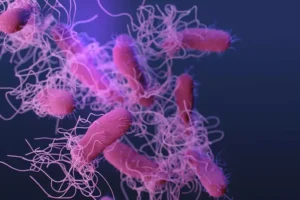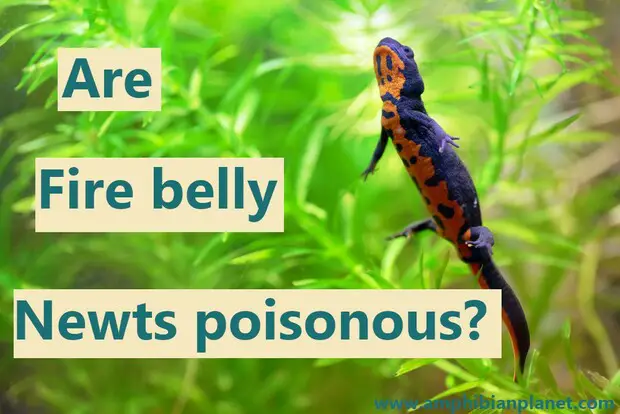Fire belly newts, (sometimes called Fire-Bellied Newts) are originally from Asia and are one of the most popular non-native newts kept as pets in the United States. These newts are actually two different species, but they are so similar that they are often referred to as a single species. But are fire belly newts poisonous?
Both the Chinese and the Japanese fire belly newts are mildly poisonous and secrete toxins through their skin. These toxins can be irritating to humans, especially when they come in contact with the mucous membranes (eyes, nose, or mouth).
Despite the presence of this skin toxin, fire belly newts are unlikely to ever cause serious harm unless the newt was licked, placed in the mouth, or swallowed.
As a safety precaution, always wash your hands carefully both before and after handling this or any species of newt (all newts are poisonous to some degree). Before washing your hands, do not touch your face, rub your eyes or put anything in your mouth.
Fire Belly Newts Are Only Mildly Poisonous
Still, their toxin is still potent enough to be harmful to humans or animals, especially if ingested in significant quantities (such as when the newt is licked or eaten).
A Brightly Colored Belly of the Fire Belly Newts
In nature, many poisonous animals display bright or contrasting colors to warn potential predators that they are toxic and would make a horrible meal. This is called aposematism or warning coloration.
The reddish-orange coloration on the underside of fire belly newts warns predators that these newts are poisonous and should not be messed with.

When approached by a predator, fire belly newts will sometimes position themselves in such a way that the brightly colored underside is clearly visible to the attacker.
An animal that eats one of these newts may fall very sick. The next time that animal sees another similarly colored newt, it will associate the coloration with danger and avoid eating it.
In this way, the bright coloration acts as a defense on its own.
Fire Belly Newts Are Not Venomous
It is important to note that there is a difference between a poisonous animal and a venomous one. Sure, they both refer to toxins that can be harmful to us, but the difference lies in how those toxins are delivered.
As a general guide;
- Venomous animals inject toxins into their victims, usually through fangs, stings, or barbs.
- Poisonous animals deliver their toxins passively, usually by secreting them on their skin.
The easiest way to think of it: If an animal is toxic because of a bite or sting, it is venomous (think rattlesnakes). If an animal is toxic when you touch, eat or lick it, it is poisonous (think poison dart frogs).

Fire belly newts cannot inject their toxin, they are only poisonous when their toxins are ingested. This means they are poisonous but not venomous.
Fire Belly Newts Usually Aren’t a Danger to Humans
Although poisonous, fire belly newts are generally harmless to humans provided they are handled carefully and gently. The only danger comes when their toxins are ingested.
The toxins can be ingested when you, for instance, handle a fire belly newt with your bare hands, then rub your eyes or stick your fingers in your mouth. They can also be absorbed through cuts or scratches on your hands.
When ingested, these toxins are very irritating and can be even harmful at sufficient levels.
For this reason, it’s a good idea to never handle newts unless when necessary. If you do handle one, observe a few simple safety precautions (more information on that below).
Amphibians Can Carry Salmonella
Like most amphibians, fire belly newts can carry salmonella bacteria in their intestines and pass them off in their waste. The Bactria usually do not cause any illness in the newt but can be transmitted to humans who come in contact with them.
You can be exposed to salmonella through contact with the waste or anything that has come in contact with the waste of a newt (including water in a newts aquarium).

When exposed to salmonella bacteria, you can develop an infection called salmonellosis which generally affects the intestines, but can spread to the bloodstream and lead to severe illness.
Fortunately, simply touching a fire belly newt will not make you ill. The bacteria are only harmful when they are ingested into your body.
For this reason, always wash your hands with anti-bacterial soap after handling newts in their cages, equipment, or anything in their enclosure (even after touching the water in their aquarium).
Are Fire Belly Newts Dangerous to Dogs, Cats, or Other Pets?
Like humans, dogs or cats can only be seriously harmed by a fire belly newts toxin if they eat or lick the newt and ingest its toxin.
A dog that ingests this toxin may have symptoms such as slobbering, spitting, or even foaming at the mouth. The intensity of these symptoms will depend on the quantity of toxin ingested, the pet’s body weight, and its general state of health among other factors.
For this reason, it is important to keep your pets away from any newts. Keep pet newts in a secure enclosure so they do not come in contact with any of your other pets.
If you notice your pet attacking a newt, take it away from the newt and contact your vet right away for further instructions.
Safety Precautions When Handling Fire Belly Newts
Generally, it’s not a good idea to frequently handle newts. This is because they have permeable skin which allows water to pass through it.
Handling a newt with dirty hands can harm it as oils, salts, perfumes, lotions, and any substances you may have on your hands can pass right through its skin and end up inside of its body.
If you ever want to handle a newt, take the following safety precautions to protect both you and the animal.
Before Handling
Make sure your hands are thoroughly washed off and are very clean. Not just clean from dirt, but also from any soap residue, lotions, or other substances that could harm the newt.
Even better, you could wear vinyl or latex gloves. Wearing gloves will not only prevent you from coming in contact with the newts’ toxins but will also protect the newt from potentially harmful substances you may have on your hands.
When Handling
- As you handle the newt, do it very gently and with care so you do not cause any stress to the newt. Newts only secrete their toxins to defend themselves when they feel threatened, so make sure the newt feels comfortable and at ease so it does not secrete its toxin.
- Do not handle the newt for a long period. Newts do not like being handled by humans, so handling a newt for too long may cause it stress.
What to Do After Handling
After handling, wash your hands with anti-bacterial soap so you do not ingest any toxin or bacteria you may have picked up from the newt.
Even if you were wearing gloves, I recommend you go the extra mile and wash your hands to protect yourself. Before washing your hands, do not rub your eyes, touch your face or put anything in your mouth.
Conclusion
Fire belly newts are completely harmless when handled with a few precautions in mind. However, they should not be frequently handled, as they can be harmful to them.
Treat them as display pets, much like fish in an aquarium, and only handle them when you really have to, such as when you clean their enclosure.

